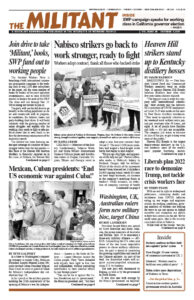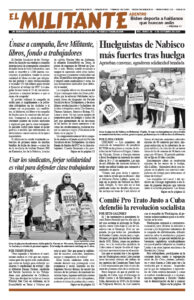October 7, 1996
WATSONVILLE, California — Carrying United Farm Workers flags, thousands marched through this predominantly Mexican and Chicano city Sept. 15. They were demanding a union contract and improved wages and working conditions for farm workers who pick strawberries.
Contingents of agricultural workers in their early 20s and teens were noticeable in the crowd. Other workers marched with their entire families.
Miguel, a picker, described the challenges facing the union in trying to organize the workers. “They [the bosses] try to disorganize us, they pick favorites, they give different pay to those they like, to get them to oppose the union,” he said. “They make threats to union workers that we will be fired or deported. We need to be united.”
In 1970 the UFW had 80,000 members. It’s now in the range of 25,000, up 5,000 from a few years ago.
October 8, 1971
DETROIT — A picket line of 7,000 angry citizens protesting the Vietnam war and the wage freeze greeted [President] Nixon when he arrived in Detroit Sept. 23. The action, which was called by the Metropolitan Detroit AFL-CIO Council, drew a large turnout from local unions.
There was a sizable contingent from a number of locals of the UAW, despite pleas from UAW President Leonard Woodcock for workers not to attend. It was the first such action initiated by a section of the labor movement, and the Detroit AFL-CIO itself took the political initiative in linking the wage freeze with the war.
The success of this action will encourage further and deeper labor participation in antiwar activities, even if certain sectors of the bureaucracy oppose it. The participation of UAW members, against the direct instructions of Woodcock, makes this clear.
October 5, 1946
TROY, N.Y. — The State Supreme Court hearing here on the Democratic Party’s appeal to rule minority parties off the ballot is one of the foulest conspiracies against democratic rights in New York history. One has to go back 25 years for anything resembling it. At that time, after World War I, Democrats and Republicans ganged up on nine duly elected Socialists and kicked them out of the State Assembly.
The proceedings are conducted in strictly kangaroo court style. The four parties [SWP, CP, SLP and SP] have about as much chance for justice here as a Negro on trumped-up rape charges would have before a Mississippi court.
Action and protest by trade unions and workers’ organizations is imperative. This case must become the springboard of a powerful campaign to revise the reactionary election laws of this state. It is deliberately written to keep minority parties off the ballot.

